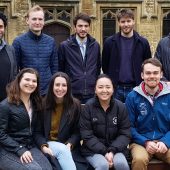
Professor Rebecca Eynon
Professor of Education, the Internet and Society
Project role: Project Investigator
Rebecca Eynon's research focuses on learning and the Internet, and the links between digital and social exclusion.

There are high hopes for MOOCs to transform education. Yet the empirical research that could help us to properly understand the educational value of MOOCs is in its infancy. As MOOCs become ever more popular, it is important to now move beyond the hype to examine the learning potential of such innovations and to locate this understanding by building on existing theoretical and methodological insights developed from previous learning and technology research. Early literature on MOOCs has investigated the nature of learner interactions with their course environments. However, to date we know very little about the nature of interactions between learners or how these individuals exchange information with one another.
Thus, through the in-depth mixed method analysis of two MOOCs that emphasize collaborative problem-solving efforts this project aims to contribute to this field through the development of a series of learner profiles that reflect the different ways in which people communicate and interact with one another in MOOCs, and how these interactions are related to learner characteristics, experiences and outcomes. These profiles will be developed based on digital trace and clickstream data, qualitative observations, pre and post surveys and qualitative interviews. Specifically the key questions are:
Ultimately, the overarching goal is to propose a typology that describes the nature of learner interactions in MOOCs that develops our understanding of how learning takes place in such settings both theoretically and practically.
The Oxford Internet Institute is a successful applicant of a competitive grant competition run by Athabasca University (Principal Investigator: George Siemens). This project, the MOOC Research Initiative, will advance understanding of the role of MOOCs in the education sector and how emerging models of learning will influence traditional education. The MOOC Research Initiative is a project funded by the Bill and Melinda Gates Foundation.

Professor of Education, the Internet and Society
Project role: Project Investigator
Rebecca Eynon's research focuses on learning and the Internet, and the links between digital and social exclusion.

Department of Educational Studies, University of Oxford

Former Researcher
Isis is a cultural sociologist focusing on emerging practices related to networked technologies. She is currently researching microwork and virtual production networks in Sub-Saharan Africa and Southeast Asia with multiple colleagues at the OII.

Former Senior Research Fellow
Taha Yasseri analyses large-scale transactional data to understand human dynamics, collective behaviour, collective intelligence and machine intelligence.

Department of Engineering, University of Oxford